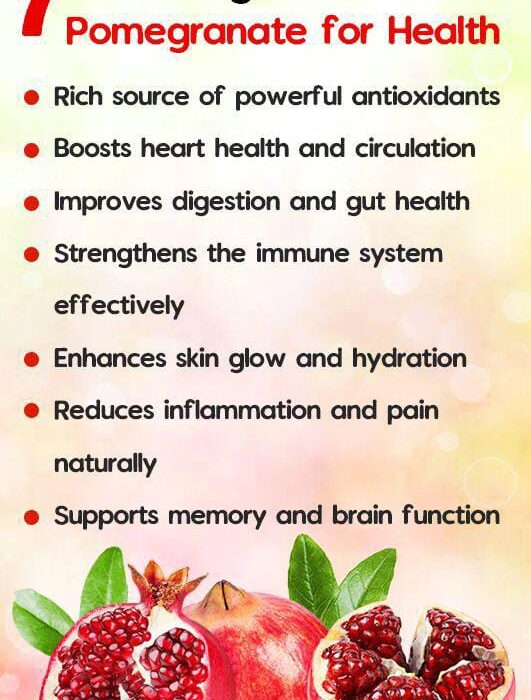What happens if I eat pomegranate every day?
Consuming pomegranate daily can enhance your immune system, improve cholesterol levels, and support overall well-being thanks to its rich antioxidant and anti-inflammatory compounds.
Is pomegranate a good source of iron?
Yes, pomegranate is among the best iron-rich fruits, helping boost hemoglobin levels. It is also packed with essential vitamins and minerals, with its vitamin C content aiding in better iron absorption, making it highly beneficial for those with anemia.
Is pomegranate high in sugar?
Pomegranates contain around 14g of sugar per 100g (17.1g total carbohydrates). Despite this, their nutritional value and health benefits outweigh concerns about sugar when consumed in moderation.
Which organs benefit most from pomegranate?
Pomegranates are known for their positive impact on the heart, kidneys, and gut health. Their potent antioxidants may also protect against conditions like Alzheimer’s, Parkinson’s, and certain types of cancer.
Who should avoid eating pomegranates?
- Individuals allergic to specific plants, as they might also react to pomegranates.
- People undergoing cancer treatments should consult their doctor.
- Those on blood pressure medications should be cautious, as pomegranates might interfere with their effects.
Which is better: pomegranate or beetroot?
For treating anemia, beetroot may have the upper hand due to its higher iron and folic acid content. However, pomegranate offers complementary health benefits, making both valuable in a balanced diet.
Is it okay to eat pomegranate at night?
Absolutely! Eating pomegranate at night is not only safe but might also improve digestion and promote heart health.
What are two major health benefits of pomegranate?
- Heart Health: Pomegranates help lower cholesterol and reduce inflammation, supporting cardiovascular health.
- Antimicrobial Properties: They can combat oral bacteria, reducing the risk of gum disease and bad breath.
Is pomegranate suitable for kidney health?
Generally, pomegranates are safe for individuals with kidney concerns. However, if potassium levels are elevated in blood tests, a kidney specialist or dietitian might recommend limiting intake.
By adding pomegranate to your diet, you can enjoy its vast array of health benefits while tailoring consumption to your specific needs.
What are the side effects of pomegranate?
Pomegranates are generally safe for most people. However, some may experience digestive issues like diarrhea. Allergic reactions to pomegranates, though rare, have been reported. Pregnant and breastfeeding women should be cautious with pomegranate extracts, as their safety in these conditions isn’t well-studied.
Which vitamin is most abundant in pomegranate?
Pomegranates are a rich source of vitamin K, which is essential for blood clotting. However, they may interfere with anticoagulant medications like Coumadin (warfarin). If you are on such medication, consult your doctor about including pomegranates in your diet.
What is the best time to eat pomegranate?
The ideal time to enjoy a pomegranate is in the morning on an empty stomach. This helps your body quickly absorb its antioxidants and vitamins, providing an energizing nutritional boost.
Can I eat one pomegranate a day?
Yes, eating one pomegranate daily is not only safe but beneficial. Research from 2023 indicates that regular consumption can improve cognitive function and reduce the risk of cognitive decline in healthy individuals.
Who should avoid pomegranates?
- Plant Allergies: Individuals allergic to certain plants might react to pomegranates.
- Surgery Patients: Pomegranates might influence blood pressure, potentially complicating blood pressure management during surgery. It’s best to avoid them for at least two weeks before any scheduled procedure.
Including pomegranates in your diet can be highly beneficial, but knowing when and how to consume them safely is equally important.
Benefits of Pomegranate for Hair
- Promotes Hair Growth
Pomegranate’s antioxidants boost blood circulation to the scalp, which helps stimulate hair growth, making it look stronger and thicker. - Strengthens Hair Follicles
The antioxidants in pomegranate, such as ellagic acid and punicalagin, strengthen hair follicles, reducing hair fall and breakage. - Tames Frizz
Pomegranate extract is effective in reducing frizz, making hair smoother and more manageable. - Brightens Hair
The natural nutrients in pomegranate can enhance your hair’s natural shine and vibrancy. - Protects Hair Color
Pomegranate peel extract acts as a shield for dyed or natural hair color, preventing fading and maintaining richness.
Nutritional Power for Hair
Pomegranates are packed with:
- Antioxidants like ellagic acid and flavonoids
- Polyphenols including punicalagin
- Vitamins and Minerals essential for hair and scalp health
- Fiber for overall nourishment
Pomegranate Seed Oil for Hair
- Soothes Itchy Scalp: The oil is known for its soothing properties, providing relief from dryness and itchiness.
- Hydrates Hair: It deeply nourishes and hydrates, making it an excellent natural conditioner.
Usage Tips
You can incorporate pomegranate seed oil into your hair care routine by:
- Massaging it onto your scalp for better blood circulation
- Adding a few drops to your conditioner for enhanced hydration
- Using it as a serum to tame frizz and add shine
With its impressive benefits, pomegranate is a fantastic natural ingredient for maintaining healthy, vibrant, and well-nourished hair!








Leave feedback about this